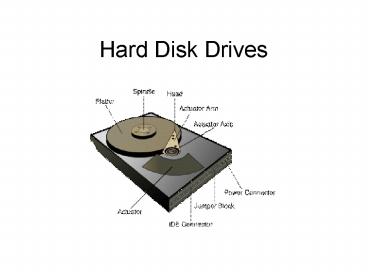Hard Disk Drives - PowerPoint PPT Presentation
Title:
Hard Disk Drives
Description:
Hard Disk Drives Types of Hard Disk Drives Speeds of Hard Disk Drives Capacities of Hard Disk Drives In modern times, there are many different sized hard drives. – PowerPoint PPT presentation
Number of Views:367
Avg rating:3.0/5.0
Title: Hard Disk Drives
1
Hard Disk Drives
2
Types of Hard Disk Drives
ATA is the current standard, it uses regular
molex power connectors and IDE cables.SATA is a
newer product (also SATA2 is already in
development) - it is faster than ATA and uses
different cables - much thinner and neater.Also
take into consideration the RPM of the drive,
5400 is a bit slow, 7200 is good, 10,000 is fast
but can be quite noisy. Servers generally use
10k rpm SCSI hard drives, but SCSI is unusual in
home computers.Most motherboards only have IDE
connections and so can only take ATA, you would
need a new motherboard for SATA hard drives.The
capacity that you need is simply dependant on how
much you plan on saving to your hard-drive.
Usually from 40GB upwards
3
Speeds of Hard Disk Drives
Rotate at 7,200 or 10,000 revolutions per minute
(RPM) and have a sequential media transfer rate
of over 80 MB/s. The fastest enterprise HDDs spin
at 15,000 rpm, and can achieve sequential media
transfer speeds above 110 MB/s. Mobile, i.e.,
Laptop HDDs, which are physically smaller than
their desktop and enterprise counterparts, tend
to be slower and have less capacity. In the
1990s, most spun at 4,200 rpm. In 2007, a typical
mobile HDD spins at 5,400 rpm, with 7,200 rpm
models available for a slight price premium.
4
Capacities of Hard Disk Drives
- In modern times, there are many different sized
hard drives. There are may different types of
capacities for both internal and external. A MAC
Hard Disk Drive can start from as low as 10Gb,
then both windows and MAC Hard Drives have many
different sizes, such as 20GB, 40GB, 80GB, 120GB,
160GB, 250GB, 400GB, 500GB, 750GB and 1TB. - External Hard Drives can consist of up to 80GB,
120GB, 160GB, 250GB, 400GB and 500.
5
Different Connections of Hard Disk Drives
- An internal hard drive has to be connected to
many different devices in a computer. The hard
drive has to be connected to the motherboard, as
well as the slave device, and the primary device. - An external hard drive is connected just like a
pen drive, through any USB Port on the computer
unit
6
How Hard Disk Drives Perform
- They usually would read and write data. They are
basically thought by many people to be an object
that stores data. There are quite a few ways how
to measure and discuss performance rate. It
depends how the person uses the computer. - Something called a performance factor is used to
determine how good the hard drive is when it
comes to performance. - The higher the factor, the better. To get a good
one is to buy it at a fair price, or sacrifice it
for diversities such as storage/capacity limit,
flexibility. - Most HDDs tend to perform much better than older
models, so you are much better off purchasing a
new one, if your old one is about 5 years old. - Things like loading speed, applications, reading
data and overwriting data are times when the HDD
is used in processing power. - References
- www.wikipedia.com for first sentence
- www.storagereview.com/guide2000/ref/hdd/perf/perf/
index.html
7
- Created by
- Mark Harrison
- Samuel Cheung
- Luke Shilleto
- Nural Amin































